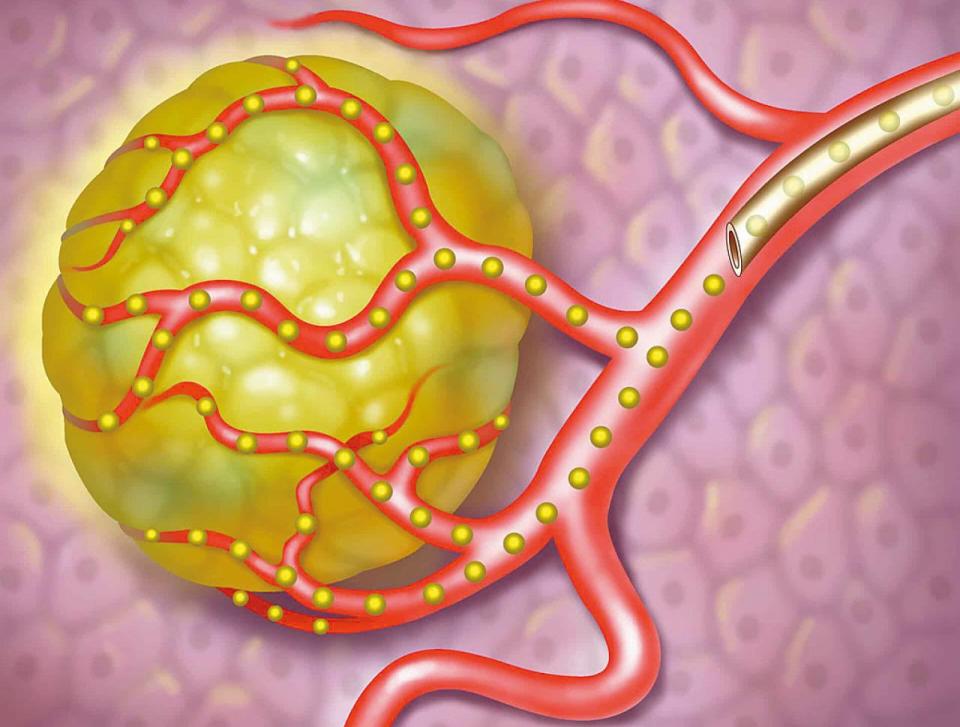According to the Hong Kong Cancer Registry, liver cancer is the third cancer killer in Hong Kong. Yttrium-90 (referred to as Y90) microparticle selective internal radiation therapy (or radioembolization) is one of the treatment options for liver cancer in recent years, and in most cases, only one course of treatment can improve the quality of life of patients.
Y90 is a spherical particle whose diameter is only one-third of the thickness of a hair. It is a radioactive isotope that emits beta rays. The course of treatment is suitable for patients with primary liver cancer or other cancers metastasized to the liver (such as metastatic colorectal cancer and neuroendocrine tumors) . Lau Wing-hang, consultant radiologist at Gleneagles Hong Kong Hospital, pointed out, “There are literatures showing that the objective response rate of Y90 treatment for primary tumors is as high as 88%, and it is also effective for diffuse tumors.”

Release radiation to kill tumors
Different from other radiation therapy courses, Y90 particle selective internal radiation therapy is a kind of interventional radiation therapy. Liu Yongheng explained, “Y90 surgery is similar to hepatic artery embolization. The radiologist is responsible for the operation part. The difference is that it does not use microspheres to block the blood vessels that deliver nutrients to the tumor. Radiation kills the tumor.” Because this course of treatment requires detailed preoperative evaluation, the entire treatment team (including experts from oncology, surgery, nuclear medicine, radiology and physics) must work together and cooperate with each other to achieve the ideal result. therapeutic effect and ensure patient safety.

fewer side effects
Traditional external radiation therapy (commonly known as electrotherapy) generally requires multiple courses of treatment to achieve the desired effect, and is prone to adverse reactions such as skin redness, dryness, itching, blisters or peeling, and other side effects; while Y90 belongs to internal radiation therapy, which is relatively It is said that the side effects are low, and there is no pain caused by the general hepatic artery embolization treatment.
Liu Yongheng said, “Although Y90 is a course of treatment with a very high radiation dose, the risk of damage to the liver or its surrounding organs is relatively low. The more common side effects include loss of appetite, abdominal pain, and fatigue about a week after the course of treatment. The situation generally occurs within one week. It will return to normal within a month.” In addition, Y90 can also be regarded as adjuvant therapy.
preoperative evaluation
Although most of the Y90 surgeries only require a single course of treatment, due to the need for precise introduction, a simulated surgery must be done before the surgery to evaluate whether the patient is suitable for the relevant course of treatment. Liu Yongheng explained, “During the simulated operation, the doctor will inject TcMAA through the hepatic artery, and then observe its distribution through nuclear medicine scans. If the liver tumor absorbs a large amount of this protein, the normal liver tissue absorbs very much. If less, it means that the patient is suitable for the Y90 course of treatment.”
Generally speaking, the formal Y90 treatment course can be performed 7 to 14 days after the simulated surgery. Liu Yongheng added that it is now possible to place a catheter through the wrist artery for Y90 surgery. Compared with traditional femoral artery intervention, the advantages are smaller wounds, faster recovery, and less risk of postoperative bleeding. Although the patient will recover faster after undergoing the Y90 operation, it is still a high-radiation course of treatment. It is recommended to avoid crowded places within one week after discharge, that is, it is not suitable to stay in places where the distance between people is less than one meter. For a long time, it is also recommended to avoid contact with children or pregnant women within two weeks after the course of treatment. Y90 can bring hope to patients with moderate to advanced liver cancer. However, patients with poor liver function or large tumors may not be suitable. You should first discuss the appropriate treatment plan with the attending doctor.
